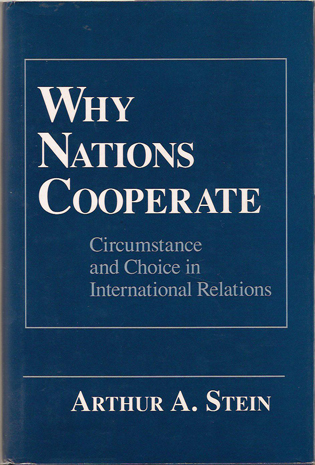
Why Nations Cooperate? Circumstance and Choice in International Relations. Ithaca, NY: Cornell University Press, 1990.
Nations choose between cooperation and conflict, according to Arthur A. Stein, and such decisions underlie the entire range of international relations, from alliance to war. When, how, and why they choose between them, and with what consequences, constitute the primary foci of international politics. In this lively and accessible book, Stein offers a new explanation of international cooperation and conflict as products of circumstance and choice. He argues that a nation's choice of cooperation or conflict is constrained not only by the nature of the international system but also by specific circumstances and by the criteria for policy choices. Different ways of formulating and assessing national interest, he demonstrates, are especially important factors in the choice for cooperation.
Stein illustrates his arguments about the bases of international cooperation and conflict with examples drawn from the study of diplomatic history, international political economy, and national security policy. Why Nations Cooperate takes a fresh approach to problems that have long been central to theoretical discussions of state behavior. The author's reassessment of such fundamental dichotomies as realism/liberalism and conflict/cooperation focuses on purposive calculation and makes use of models of strategic interaction. Although theories based on realism and liberalism come to contradictory conclusions about the prospects for international cooperation, their analyses are derived from a set of shared assumptions about the nature of international relations. Stein argues that these core assumptions about the autonomous self-interested behavior of states in an anarchic international system are consistent not only with conflict but with cooperation. He reassesses the implications of these assumptions and concludes that stronger possibilities for bilateral cooperation exist than would be expected by either liberals or realists. Stein illuminates the ways in which strategic interaction analysis may be used to integrate the individual, the state, and the system in the study of international relations. In the process he also refines our notions of security, hegemony, competition, and misperception and eventually our definition of choice.
Specialists in international relations, political economy, and security affairs will want to read Why Nations Cooperate.
REVIEWS:
Why Nations Cooperate is a much "bigger" book than its relatively short length would suggest. In its pages, Arthur Stein addresses many of the important issues confronting students of international relations. Among these are the establishment and maintenance of regimes, the formation of alliances, the efficacy of strategies of cooperation, the causes of arms races, and the level of analysis problem. Stein even attempts to resolve the dispute between realist and liberal scholars regarding the true nature of international politics. What makes this work impressive is the extent to which he succeeds. . . .
Why Nations Cooperate is a major achievement. Unlike many works on the subject, this is no exercise in abstract theorizing or mathematical manipulation. Stein's game-theoretic models (he prefers the term "models of strategic interaction") are simple and serve only to illuminate an already lucid exposition. Provided with real-world examples to illustrate each of his theoretical propositions, the reader can easily envision national decision makers engaging in precisely the kinds of calculations Stein describes. Wide ranging, beautifully argued, and eminently accessible, Why Nations Cooperate is a splendid contribution not only to the literature on cooperation and conflict, but international politics in general.
--Vincent R. Rock, Journal of Politics
Attest[s] to the vitality of current theorizing in international relations.
--Andrew J. Pierre, Foreign Affairs
Stein's book is informative and rigorous yet sparing in technical apparatus.
--Steven Luper-Foy, Ethics
Stein writes clearly. The book is a good example of the use of [simple game-theory] models to clarify the arguments which would be hard and convoluted without them. No one, however innumerate, should feel themselves excluded from Stein's work. Stein is well read not only in the literature of international relations and related aspects of economics but also in other applications of rational choice theory.
--Michael Nicholson, International Affairs
TABLE OF CONTENTS
1 Realism, Liberalism, and Dilemmas of Strategic Choice
2 Coordination and Collaboration: Dilemmas of Common Interests and
Common Aversions
3 Misperception and Strategic Choice
4 Extinction and National Survival
Appendix 1 The Shadow of the Future
Appendix 2 Iterated Prisoners' Dilemma with Bankruptcy
5 The Struggle for Advantage: Dilemmas of Hegemony and Competition
Appendix 1 Relative Weighted Calculations in a Prisoners' Dilemma
Appendix 2 Implications of a Different Dominant Strategy for Different
Decision Criteria
Appendix 3 Sen's Paradox
6 Alliances and Dilemmas of Entanglement
Appendix 1 Implications of a Different Dominant Strategy for Different
Decision Criteria
Appendix 2 Altruism and Self-Interest
7 Conclusion: Structure, Circumstance, and Choice in International Relations